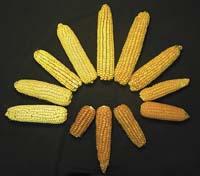The maize genome, broad and complex

An international consortium of researchers decodes one of the most complex genomes that exist
Genetically, maize is not a single plant, the differences between varieties are very large, so there is no single genome of maize. In addition, in the genome of each variety there are DNA sequences of easy displacement. However, researchers have managed to complete the puzzle of the maize genome and the results of the research have been published in the journal Science in a batch of five articles.
A consortium of international researchers has coordinated all research from the United States. They have invested $31 million and have been four years of work, which has allowed them to create a map of the maize genome.
Corn has 10 chromosomes, 2.3 billion base pairs and, according to the results of the researchers, 32,000 genes. It is not the largest plant genome (the onion plant, for example, has more genome), but researchers have found it to be one of the most complex. Among many sequences that change places, which account for approximately 85% of the genome. And the movements of these sequences have made the work of researchers very difficult.
However, they have been able to decode and compare the genomes of many maize varieties. The largest is the B73 variety. This strain has been compared to the M017 variety and hundreds of genes have been found in one or the other but not both. This comparison clearly explains that these two varieties could be combined to create better maize varieties.
On the other hand, comparing the B73 variety with the Mexican variety Palomero and the original teosinous corn, the genetic history of maize variants has also been analyzed. In this history, human influence has been analyzed, since in the genome of the most recent varieties appear traces of the domestication of corn.
The research has been very extensive; researchers hope it will be useful not only for the importance of maize in the world of food, but also for the development of new resources for the research of complex genomes.





